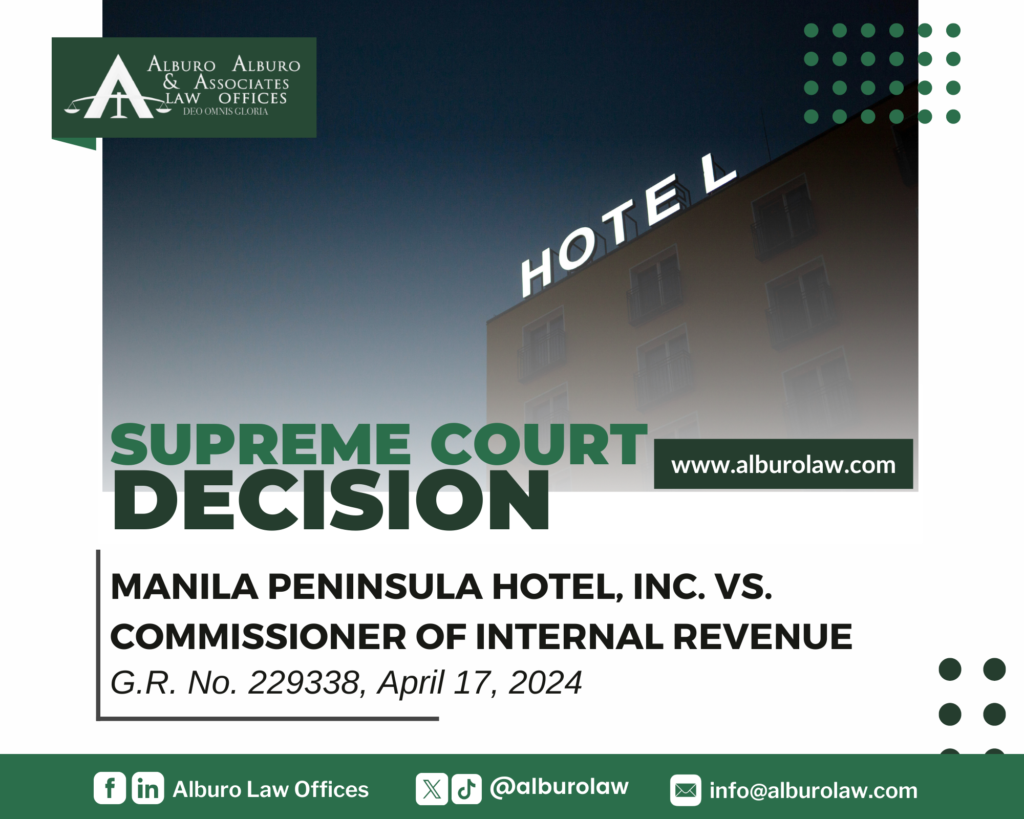It emphasized that administrative issuances cannot expand or modify statutory requirements beyond what is prescribed by law. The Court clarified that Section 108 (B) (4) of the National Internal Revenue Code (NIRC), as amended, does not include the requirements introduced by the circulars. These conditions were not specified in the NIRC or its amendments, and thus, the circulars exceeded the authority of the BIR. The ruling reinforces that VAT zero-rating should align strictly with the statutory language and not be subject to additional, unwarranted conditions imposed by administrative issuances.
(The case of Manila Peninsula Hotel, Inc. vs. Commissioner of Internal Revenue, G.R. No. 229338, April 17, 2024)

Photo from Unsplash | Marten Bjork
The following post does not create a lawyer-client relationship between Alburo Alburo and Associates Law Offices (or any of its lawyers) and the reader. It is still best for you to engage the services of a lawyer or you may directly contact and consult Alburo Alburo and Associates Law Offices to address your specific legal concerns, if there is any.
Also, the matters contained in the following were written in accordance with the law, rules, and jurisprudence prevailing at the time of writing and posting, and do not include any future developments on the subject matter under discussion.
AT A GLANCE:
In this case, the Supreme Court addressed the validity of Revenue Memorandum Circulars No. 46-2008 and No. 31-2011, which imposed additional requirements for VAT zero-rating on services provided to entities engaged in international air transport operations. Manila Peninsula argued that VAT zero-rating for such services required only two conditions: the service must be provided by a VAT-registered service provider in the Philippines and rendered to persons engaged in international air transport. In contrast, the CIR contended that the additional conditions stipulated in the circulars—namely, that the services must pertain to the transport of goods or passengers directly from a Philippine port to a foreign port without stopping at any other Philippine port—were also required.
Manila Peninsula Hotel, Inc. (MPHI), a domestic corporation registered with the Bureau of Internal Revenue (BIR), sought a refund of PHP3,807,771.77 in VAT payments for taxable year 2010. MPHI had provided hotel accommodations and food services to Delta Air, a foreign corporation, and claimed that VAT was erroneously collected on these transactions. After filing an administrative claim with the BIR and receiving no action, MPHI escalated the issue to the Court of Tax Appeals (CTA). The Commissioner of Internal Revenue (CIR) opposed the claim, arguing that MPHI lacked legal standing, the claim was time-barred, and that VAT should not have been imposed as the receipts indicated ‘zero-rated’ transactions. CIR also contended that MPHI failed to exhaust administrative remedies, did not comply with documentary requirements, and that tax exemptions should be construed strictly against the claimant. MPHI countered by asserting its legal standing, the timeliness of its filing, and that any documentary shortcomings did not undermine its refund claim. The case centers on these issues of legal standing, procedural compliance, and the proper application of VAT laws.
In this case, the Supreme Court addressed the validity of Revenue Memorandum Circulars No. 46-2008 and No. 31-2011, which imposed additional requirements for VAT zero-rating on services provided to entities engaged in international air transport operations. Manila Peninsula argued that VAT zero-rating for such services required only two conditions: the service must be provided by a VAT-registered service provider in the Philippines and rendered to persons engaged in international air transport. In contrast, the CIR contended that the additional conditions stipulated in the circulars—namely, that the services must pertain to the transport of goods or passengers directly from a Philippine port to a foreign port without stopping at any other Philippine port—were also required.
The Court ruled in favor of Manila Peninsula, holding that the additional conditions imposed by the circulars were invalid. It emphasized that administrative issuances cannot expand or modify statutory requirements beyond what is prescribed by law. The Court clarified that Section 108 (B) (4) of the National Internal Revenue Code (NIRC), as amended, does not include the requirements introduced by the circulars. These conditions were not specified in the NIRC or its amendments, and thus, the circulars exceeded the authority of the BIR. The ruling reinforces that VAT zero-rating should align strictly with the statutory language and not be subject to additional, unwarranted conditions imposed by administrative issuances.
Source:
Manila Peninsula Hotel, Inc. vs. Commissioner of Internal Revenue, G.R. No. 229338. April 17, 2024
Alburo Alburo and Associates Law Offices specializes in business law and labor law consulting. For inquiries regarding taxation and taxpayer’s remedies, you may reach us at info@alburolaw.com, or dial us at (02)7745-4391/0917-5772207.
All rights reserved.


